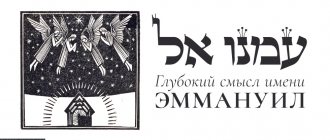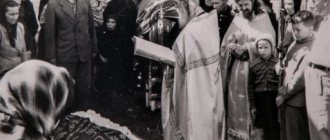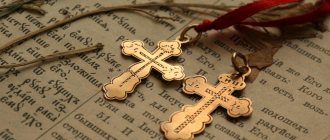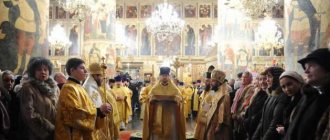How did they address priests before the 20th century?
Until the 18th century, white clergy were called priests in the Russian Empire (unlike the black priesthood - monastics, priests could get married). This name also extended to the priest’s family, for example, the priest’s wife was called the priest, the daughter was called the priest, and so on.
After Nikon’s reform, the word “pop” was widely used among the people, along with father, priest and priest. The laity usually called the pastor not by rank, but by his first name and patronymic.
The word “pop” acquired the most negative connotation since 1917, after the Bolsheviks came to power. The systematic anti-religious policy of Soviet Russia still affects both believers and the clergy.
^ What did the Pharisees' teachers mean?
So for what purpose did the Pharisees use the titles “father” and “teacher”? The answer should be sought in at least two areas that are key to power: teaching and personal qualities.
Let us first consider the teaching of these Pharisaic teachers. They started it off right, with the Law of Moses. Jesus said, “The scribes and Pharisees sat in Moses’ seat” (Matt. 23:2). The Mosaic Law was an authentic tradition. God gave it to Israel through Moses. The duty of the Pharisaic teachers was to preserve this tradition and pass it on unchanged to the next generation.
Too often, however, it happened that this or that teacher added a grain of his own wisdom to the true tradition, thereby clouding it. Instead of passing down from generation to generation this sacred pledge along with its true interpretation, such a teacher added a personal interpretation. In turn, his students, becoming teachers themselves and imitating their mentor, did the same. And Divine tradition once again turned into human tradition. (Some things never change, do they!).
The end result of this whole process was to nullify the authentic Mosaic tradition. It was to these Pharisaic teachers that Jesus said: “For you, having abandoned the commandment of God, hold to the tradition of men” (Mark 7:8). And then: “Is it good that you set aside the commandment of God, that you may keep your own tradition... making void the word of God by your tradition which you have established” (Mark 7:9, 13).
In order to put an end to this human tradition, which had supplanted the tradition of Moses, and to return people to the truth, Jesus said to his disciples: “But do not call yourself teachers.” In other words, he commanded them not to use their positions as fathers and teachers as an opportunity to group followers around their private opinions. For to do so meant “to close the Kingdom of Heaven to men.”
Instead, with the coming of Christ, these Pharisaic teachers—indeed, everyone who preached the Word of God—were called upon to faithfully transmit to their followers the authentic tradition of only one Teacher: Christ Himself. The Bible calls this particular tradition, in the words of the Apostle John, “the teaching of Christ.”
In fact, as we noted earlier, this is why the teaching of the Twelve came to be known as the “apostolic doctrine.”
Since their time, successive generations of fathers and teachers of the Church have transmitted and protected the apostolic teaching about Christ with all care, for it represents the true interpretation of Holy Scripture.
This fidelity to the true Christian faith. incidentally, can best be seen in the activities of the Seven Ecumenical Councils of the Church, convened between the fourth and eighth centuries. Anyone who professes to be a teacher of the Christian faith must strictly adhere to the Apostolic teaching handed down from generation to generation through these Councils. Otherwise, he runs the risk of introducing his own “private opinion.”
Just as it is true that all teachers of the Christian faith must choose the right starting point, namely, the Holy Scriptures, it is also true that they must give a correct and accurate interpretation of the Holy Scriptures, based on the teaching handed down by holy and divine teachers and fathers of the Church, especially at the Seven Councils.
Why are the Seven Ecumenical Councils so important? Because they point to the true teaching about the Person of the Lord Jesus Christ and about the Holy Trinity. They faithfully reflect the teaching of Holy Scripture about the one true Teacher and Guide, Jesus Christ. Teachers and fathers who offer private interpretations that contradict the teaching about Christ set forth at the Seven Ecumenical Councils should not, in my opinion, be recognized as true teachers and fathers.
Priests in Russian fairy tales
It is incorrect to say that the word “pop” became negatively connoted only in Soviet times. Russian fairy tales often feature priest characters, and jokes from the times of the Russian Empire ridiculed the negative, completely non-Christian actions of “priests.”
It was not the rank itself that had a derogatory connotation, but rather unscrupulous representatives of the clergy: greedy, stupid and cruel.
In folk tales there were both positive and negative priests. But most often, the priest in Russian legends is a neutral character and is mentioned in passing, as for example, in the fairy tale “Lousey Boots,” where the priest gives his daughter in marriage in an original way.
And if we talk about fairy tales, the first thing that comes to mind is the work of Alexander Sergeevich Pushkin about the priest and his worker Balda. With the light hand of the classic, the rank of “priest” acquired a disparaging connotation and became a household name in relation to a stingy and dishonest clergyman. After its publication in the 19th century and to this day, the fairy tale is perceived ambiguously by the Orthodox Church.
Orthodox Life
Archpriest Vladimir Puchkov answers.
Addressing a priest with the word “father” is a matter of course for the church environment. For non-church people, it often becomes a stumbling block. Personally, I have heard the question of why priests are called fathers more than a dozen times. Questioners are usually confused by several points:
Firstly, the father is always the one who is higher. How can you recognize someone’s dominance over you when all people are equal?
Secondly, how can you call a stranger your father? Father is not an abstract concept, it is someone dear and close. If I see a priest for the first time in my life, then what kind of father is he to me?
Thirdly, what to do with the fact that among the priests there are many young people, and I personally am forty, fifty, sixty? How can a man who is younger than me be called my father?
And finally, how can you call clergy fathers, if Christ said “and do not call anyone on earth your father” (Matthew 23:9)? However, first things first.
The belief in the equality of all people is one of the most absurd misconceptions of our time. Indeed, where and when could equality be seen? What should an environment be like where all people are equal? The fact that equality is impossible as such is obvious and natural. People are born unequal: we all have different talents, abilities and potential. Different health and inclinations. Different social environment, material level and living conditions. And if you think that at least everyone is equal before God, then disappointment awaits you here too: remember the Gospel “to whom much has been entrusted, the more will be required of him” (Luke 12:48) and you will understand that not one and the same sin, no one and the same virtue of different people is valued by God in the same way. You can, of course, talk about the equality of everyone before the law and the equality of rights, but this equality is very relative. Equal rights given to different people do not at all guarantee equality of opportunity. Therefore, it is not surprising that the Church, accepting the inequality of people as a given, not only does not strive to realize controversial ideals in itself, but, on the contrary, values its own hierarchy and sees in it one of its own foundations. Hierarchically, the priest is higher than the laity, but this height is not the height of power, but of responsibility. The priest is responsible for the flock, his primacy is in care and love. Just like the father in the family. Actually, for his flock the priest is the father - the head of the church community, a kind of spiritual family. So, when parishioners call priests priests, this is the most normal norm, and there is nothing unnatural in it.
However, for people who do not belong to the Church, the priest is a stranger. Why would they call priests fathers? I’ll answer the question with a question: have you ever wondered where the tradition of addressing a person as “you” came from? It's very simple: there are a number of people who are responsible for others - rulers, priests, leaders, fathers of families. When the elementary culture of communication requires showing emphatic respect to someone, he is addressed not only as a person, but as someone who represents everyone for whom he is responsible: the people, the flock, the team, the family. It’s the same with the priesthood: it’s no secret that the priesthood is not a job, but a way of life. Therefore, pastoral responsibility is inseparable from the personality of the shepherd. This means that the status of a father belongs to the priest due to his lifestyle, regardless of the environment. Consequently, the priest is always a father: for the flock, as the head of the spiritual family, for everyone else - as one who is connected with this family by inextricable ties of responsibility.
With all this, we should not forget that the gift of the priesthood does not belong to the priest himself. It is given by God to the Church, and the Church delegates it to a specific person. The Church of Christ, as you know, is more than two thousand years old. Therefore, when priests are called fathers by people older than them, the latter should remember that the rank bestowed on a very young priest is older than anyone else living on earth. By the way, in this regard, it is stupid to get angry when priests are called priests. After all, “pop” is a very archaic version of the word “dad,” that is, father. By the way, for centuries in Rus', priests were quite officially called priests. The odious archpriest Avvakum, let me remind you, lived in the 17th century and no one was embarrassed then by the fact that they called him not an archpriest.
And finally, yes, if Christ said not to call anyone father, this does not mean at all that what was said has an exclusively literal meaning. In this case, the Savior denounces the Pharisee’s arrogance. Of course: Pharisees and teachers, and mentors, and fathers... And in the words of the Lord one can hear the obvious: do not take their example and do not play along with them. In the proper sense, we have one Father - God, and it is not for nothing that the Gospel depicts before us the Kingdom of God as a family with the Father-God at the head. But this perfect family has projections in the world: our ordinary families and spiritual families, that is, Christian communities. And the heads of these families are called fathers precisely because the Father of all fathers is God.
So, priests are called fathers because of their ministry and way of life, because of respect and tradition, because of the antiquity of such an institution as the priesthood, and the natural state of things. And there is nothing in this that contradicts the Gospel, the rules of basic decency and common sense.
Memory of the Fathers Betrayed
The Baptism of Rus' in 988 could not overnight destroy the pagan influence on the mentality of the people. Christian missionaries were not always and not everywhere welcomed with open arms.
Neo-pagans believe that because of the hostility towards new shepherds, the common name for Christian preachers came about - priest, i.e. betrayed the memory of his fathers.
But this hypothesis has nothing to do with historical reality. Sources confirm that the pagan faith, although it was considered erroneous, everyone treated the customs of their ancestors in Rus' with respect. In “The Tale of Igor’s Campaign,” the Russians are called Dazhdboz’s grandchildren, despite the fact that the author was a Christian.
^ Problem of interpretation
Some Protestant interpreters believe that Jesus was pointing out the inadmissibility of calling church leaders fathers. Of course, they believe that by “fathers” in this passage of Scripture is meant a spiritual father. Based on this, they refuse to call their clergy fathers, preferring such titles as pastor, reverend, or even brother.
So first let me say that this is more of an interpretation of the Lord's words than what He actually meant. I do not deny the need to interpret Scripture. I just want to emphasize that the Lord said “father” and not “spiritual father.”
What is the point of contention here? That, taken literally, Jesus' warning against calling anyone father not only prohibits calling priests fathers, but also deprives the earthly fathers, the ancient Church fathers, and even the city fathers of this title - doesn't it? For in reality the statement of the Lord, as it appears in the text, means that only one Person can ever be called Father, namely, our Father who is in heaven.
But should the Lord's words be taken literally, as is usually done? Can we really not call Orthodox priests fathers? If this is so, then a problem immediately arises with several other biblical passages, including some sayings of the Apostle Paul. To the Corinthian church the Apostle wrote: “For although you have thousands of teachers in Christ, yet you have not many fathers; I have begotten you in Christ Jesus” (1 Cor. 4:15). Doesn’t Paul call himself the spiritual father of the Corinthians—“Father Paul,” if you will?
In addition, he boldly refers to his spiritual ancestors as our “fathers.” And to the fathers according to the flesh from Colosse he addresses himself as follows: “Fathers, do not provoke your children to anger, lest they become discouraged” (Col. 3:21). It is obvious that the Apostle Paul did not understand the words of the Lord Jesus Christ in such a way that only the heavenly Father should be called father.
One may also recall that when the rich man saw “Abraham and Lazarus on his bed” in heaven and turned to Abraham: “Father Abraham!”, he did not answer, “Don’t you know that only God the Father can be called Father?” On the contrary, he said: “Child! Remember” (Luke 16:20-31).
Anti-religious propaganda
The greatest blow to the word “priests” was dealt by the Soviet ideological campaign. Anti-religious propaganda was not only not prohibited, but was also encouraged. The Constitution of 1936 prohibited any missionary activity.
The image of the clergyman was ridiculed in newspapers, books, and on the radio. Almost everywhere the clergyman was portrayed as a greedy, immoral, repulsive character. And they called him exclusively “pop”. The Soviet leadership understood perfectly well who the target audience was: workers and peasants were unlikely to call priests “priests.”
Many documentary evidence of the persecution of the Orthodox Church has been preserved: these are grotesque propaganda caricatures, caustic, cynical lampoons, speeches by the “Union of Godless” and so on. The consequences of militant atheism are still evident today.
Some modern followers of religionists cross the line of criticism of religion and are incapable of constructive discussion. They use the word "pop" as an insult.
^ Personal qualities of teachers
The second major issue in the leadership of the Pharisaic teachers that troubled Jesus was personal character. He noticed a major flaw in the character of the scribes and Pharisees, which can be called self-exaltation. They used their position as fathers and teachers among God's people to exalt themselves. They wanted to make sure they got the recognition they deserved - a carpeted office with an attached sauna, and a silver four-door Buick. Seeing these personal shortcomings, Jesus said, “Let the greatest of you be your servant; for whoever exalts himself will be humbled; but whoever humbles himself will be exalted” (Matthew 23:11-12).
Their spirit of self-exaltation manifested itself in several ways. Firstly, in hypocrisy. “For they say,” said Jesus, “and do not.” Lots of words and little action. Their words were worth little, since they completely contradicted their behavior. They boasted of long prayers and at the same time “ate the houses of widows.”
They preferred to swear by the temple gold rather than by the temple itself, which sanctifies the gold, thereby revealing their hidden love for money. Although they paid tithes on mint, anise and cumin, which they did willingly, they neglected much more important things in the law: judgment, mercy and faith.
Because they were hypocrites in this and many other things. The Lord summed up His reproof with the words: “So you also, outwardly, appear righteous to people, but inwardly you are filled with hypocrisy and lawlessness” (Matthew 23:28). Obviously, their "inside" did not match their "outside" because they were full of the spirit of self-aggrandizement and selfishness.
Another manifestation of their spirit of self-exaltation was the apparent insufficiency of their own actual service. “They bind heavy and unbearable burdens and lay them on people’s shoulders, but they themselves do not want to lift them with a finger” (Matthew 23:4).
It was impossible to detect dirt under their feet or stains on their clothes. They were simply a group of lazy leaders who expected others to serve them instead of serving themselves. It is not surprising, therefore, that Jesus commanded not to be like them, for “the greatest of you shall be your servant” (Matthew 23:11).
The third manifestation of their spirit of self-exaltation was narcissism, expressed in the desire to be seen by people. It was also manifested in their love for presiding over feasts and synagogues and greetings in public assemblies, so that people would call them “teacher!” teacher!" Such narcissism was a direct violation of the Mosaic Law, which they claimed to be the guardians of. For the entire Mosaic Law can be summed up in two great commandments, the greatest of which is: “Thou shalt love the Lord thy God with all thy heart, and with all thy soul, and with all thy mind” (Matthew 22:37).
And the second commandment, similar to it: “Love your neighbor as yourself” (Matthew 22:39).
Thus, these fathers and teachers did not raise their people to love God and neighbor. On the contrary, they showed a spirit of self-exaltation and selfishness, filled with self-love.











